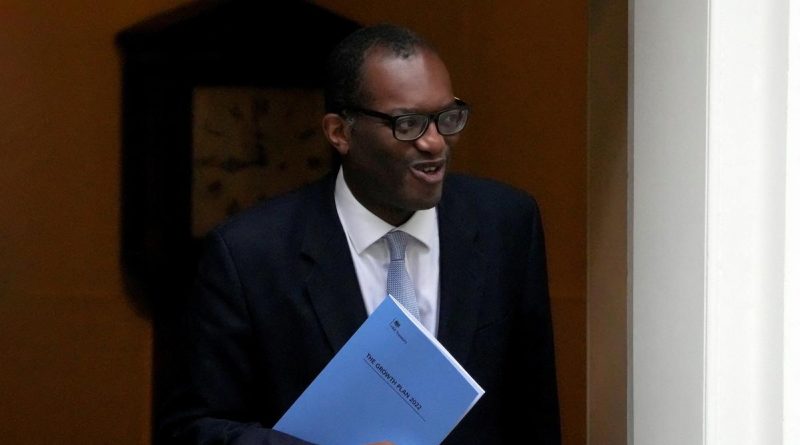Chancellor Scraps Plans To Cut 45p Income Tax Rate
The UK government has announced that it’ll abandon its plans to scrap the 45p income tax rate for high earners. Kwasi Kwarteng, Chancellor of the Exchequer, disclosed these tax cut plans just 10 days before its abandonment news came in. Moreover, he calls it a “massive distraction” from a “strong package.”
Wondering what this ‘scrapping of 45p of income tax was?
The government previously declared it will eliminate the 45p income tax rate for those making over £150,000 annually. The announcement was a component of a tax-cut package. It was a part of a “bold and unabashed” push for growth, according to Kwarteng. Besides, he also planned to reduce the base rate of income tax by 1p next year.
With this, the chancellor promised tax savings totaling £50 billion. His intention was to scrap the national insurance increase, the freezing corporation tax, and the reduction of stamp duty.
However, this decision could cause a political fallout, as it affects 629,000 people who make over £150,000.
Labour will probably claim that it is a tax break for the wealthy. Moreover, it happens at a time when many others are having a hard time keeping up with living expenses.
However, Liz Truss and Kwarteng think it will encourage investment in the UK. Additionally, he would delay the 1p reduction in the basic rate of income tax until next year. It was originally going to take effect in April 2024.
Kwarteng also aimed to stimulate the real estate market by raising the starting point for stamp duty from £125,000 to £250,000. The upper limit for first-time buyers will increase from £300,000 to £425,000.
Kwarteng has also confirmed the 1.25% point reduction in national insurance payments. The government will bring it into effect on November 6. According to ministers, 28 million people will be £330 better off next year. Moreover, the price hike was intended to generate £13 billion annually for health and social services.
All these changes have received severe criticism from people. Thus, now, the government has decided to take them back.
What does Kwarteng have to say?
According to Mr. Kwarteng, the idea would “drown out a solid package.” It included reductions in the basic rates of income tax and company tax as well as support for energy bills. As he finds people not liking the idea of tax cuts amid the current situation, it could be the major reason the government is not proceeding with it.
However, when asked if he owed anyone an apology, he responded that they have heard the people. And yes, that does contain humility and repentance. But he’s glad to own it.
He continued, saying, “We got it wrong, and we are not going to move forward with the repeal of the rate.” Therefore, the prime minister chose not to proceed with the rate’s removal.
Nonetheless, when asked if it was her decision, Mr. Kwarteng responded negatively and that they talked together. Further, he said this is what he was planning to do, and they agreed together. So, we can say that they were in agreement that the government wouldn’t go with the abolition of the rate.
Besides, when asked if he had thought about leaving, he responded, “Not at all.”
The prime minister, according to Downing Street, still has faith in Mr. Kwarteng.
Ms. Truss had told the BBC on Sunday that the decision to lower the top rate of income tax was “one that the chancellor made.” However, she added that she was fully committed to it. The government intended to make it a part of the plan to “simplify” the tax code and spur economic growth.
What could be the future economic plans of this government?
Mr. Kwarteng has made implications that there would be no tax cuts before the upcoming Budget in the spring.
Moreover, this is a topic of discussion about whether his economic goals will result in reductions in spending for public services. To this, the chancellor responded that we would get further information in the government’s budget plan on November 23.
However, he insisted that the government would adhere to its 2021 Comprehensive Spending Review. Also, it would not increase spending to keep up with inflation.
Besides, the independent spending watchdog, the Office for Budget Responsibility, had criticized the government for not issuing an economic prediction along with the 45p tax rate issue.
Mr. Kwarteng told the BBC that there wasn’t enough time to get a complete prediction and that he had wished to go at a “fast speed.”
Divided opinions on top-rate tax cuts
Labour urged the government to “change their entire economic, discredited trickle-down plan.”
Meanwhile, according to shadow chancellor Rachel Reeves, the reversal came “too late for the people who will pay higher mortgages and greater prices for years to come.”
On the other hand, SNP leader Nicola Sturgeon stated that the government had displayed “total ineptitude.” Meanwhile, Lib Dem leader Sir Ed Davey urged for the chancellor to step down. They claimed he no longer had “any credibility” and the government needed to overhaul the entire mini-budget.




